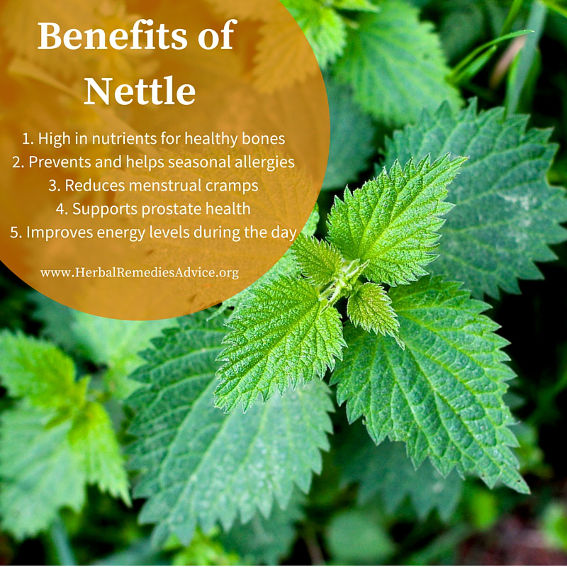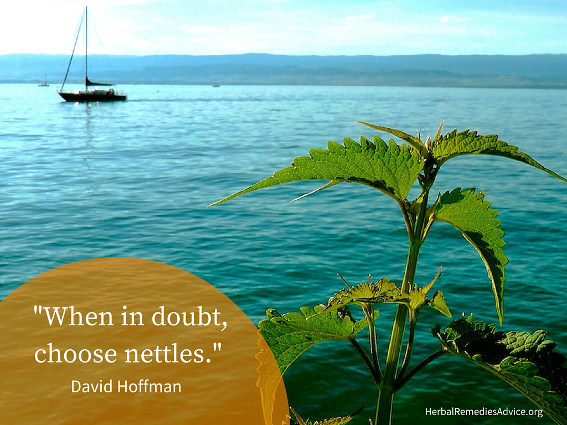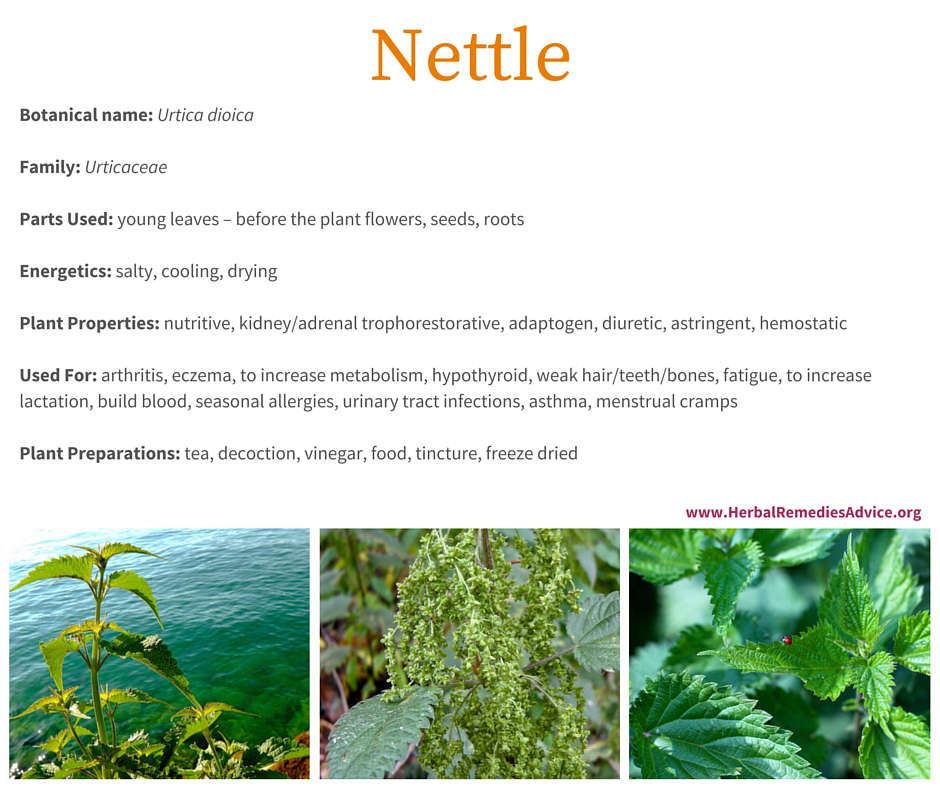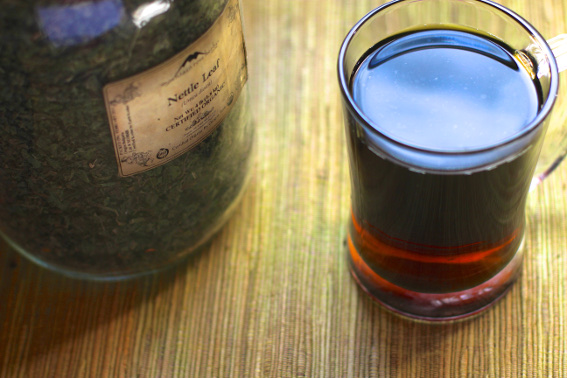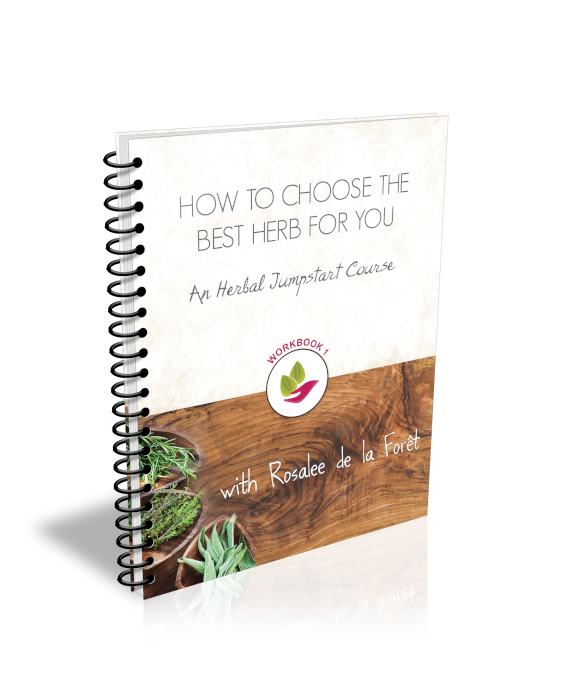Get weekly tips, recipes, and my Herbal Jumpstart e-course! Sign up for free today.

Nettle Herb
Share this! |
|
Nettle herb is a somewhat plain-looking plant, but if you happen to brush by a one it will jump out and demand your attention. Stinging nettle is protected by needle-like projections that easily inject irritating substances into the skin. As a result, many people are introduced to it in an abrupt and often uncomfortable way. However, once you get to know this powerful herb, it’s easy to fall in love with it.
Herbalists use nettle herb both as a highly nourishing food and as medicine. It’s used for both women’s and men’s reproductive health, to restore energy levels, to detoxify the body (by supporting elimination organs), to relieve allergies, and to strengthen bones, hair, nails and teeth. It might be easier to discuss what nettle doesn’t do!
Nettle Benefits as a Nutritive Plant
Nettle herb is nutrient dense and eating it regularly can supply you with the needed vitamins, minerals, and phytonutrients that are most likely missing from your diet.
What do I mean by that?
Over time, our foods have been slowly losing their nutrients. Some of this is due to the depletion of agricultural soils and some is due to our own selective choices. Let’s take apples as an example. Wild ancient apples were small and bitter and we’ve selectively bred them to be bigger and sweeter. While our newer apples may taste better than their ancestors, they are alarmingly lower in nutrients. In her book, Eating on the Wild Side, Jo Robinson says that, when comparing modern apples to their ancestral counterparts, some wild varieties contain 100%-400% more nutrients than the apples you find at the grocery store!1
What does this loss of nutrients mean for us? It is getting increasingly difficult to get our daily recommended amount of nutrients within a reasonable caloric intake. In other words, you would have to eat quite a few more “modern” apples to get the same nutrients available in their wild counterparts (or even what was being eaten two generations ago). This dietary nutrient scarcity leaves us vulnerable to degeneration and chronic disease.
Back to stinging nettle…
Stinging nettle is a powerful source of many nutrients. It is a notable source for calcium, manganese, magnesium, vitamin K, carotenoids, and protein.2
Herbalists specifically use these nutrient-dense qualities to restore health in a variety of ways.
Because of its mineral content, nettle herb is a favorite for strengthening bones, hair, nails, and teeth. It’s high in nutrients, such as calcium and magnesium, which are needed for a strong integumentary system. It’s often combined with oatstraw (Avena sativa) for addressing osteopenia and osteoporosis.
Feeling run down, fatigued, or otherwise dragging yourself through your day? Nettle leaf can support healthy energy levels. It may do this through a variety of actions, but at least part of that action comes from its nutrient-dense qualities. Nettle seeds are also used to restore energy (see below for more information).
Nettle infusions are a reliable way to boost iron levels. I’ve spoken to many women who have chosen to use nettle herb instead of iron supplements in the early stages of pregnancy to increase their iron levels. Restoring iron levels can also relieve fatigue.
Some people experience muscle cramping due to nutrient deficiencies. Regular ingestion of nettle infusions can restore mineral reserves and relieve menstrual cramps or leg cramps.
This was a short list of ways that nettle herb may improve some nutrient deficiency symptoms. Restoring nutrient deficiencies can have a myriad of positive effects. Perhaps this is why herbalist David Hoffman wisely recommends, “When in doubt, choose nettle.”
Stinging Nettle for Allergies
Nettle herb is commonly used to decrease seasonal allergic responses, such as hay fever. While the exact mechanism of how this works is unknown, some hypothesize that nettle’s natural histamine content may down-regulate the allergic response. Nettle has also been shown to decrease inflammatory markers, such as C-reactive protein, which could also play a role in relieving seasonal allergies. The astringent action of nettle also contributes to the action of reducing a runny nose.
I’ve often recommended nettle for people with seasonal allergies and I’ve found the preparation used, dosage, and duration are important to consider for the best results. Here are my recommendations.
1. Use stinging nettle nourishing infusions (1 ounce of nettle leaf by weight, infused in 32 ounces of just-boiled water for 4-8 hours) daily in the months leading up to allergy season. This often eliminates or strongly decreases allergy symptoms.
2. Use titrating doses of freeze-dried stinging nettle leaf capsules or powder for controlling the acute symptoms of allergies. (Titrating means to increase doses of the product until results are achieved. Some people find relief after taking a couple of grams, others may find they need as many as 15 grams.)
3. I’ve also had some good results with using stinging nettle extract (tincture) made from fresh plants. I also often combine this with peach bark/leaf and plantain tinctures.
Watch my video on How to Make Nettle Tea for Seasonal Allergies here!
Nettle Benefits for Inflammation and Type 2 Diabetes
Researchers have taken an interest in examining nettle’s effects on the symptoms and disease markers of people with diabetes mellitus type 2.
Type 2 diabetes is a chronic inflammatory disease and patients diagnosed with it often have elevated markers for oxidative stress. Studies have shown that patients with type 2 diabetes who take nettle herb have increased antioxidant levels and decreased inflammatory markers such as Interleukin-6 and C-reactive protein.3,4
These are potentially powerful results for people facing a disease known for its chronic inflammatory effects. While these studies specifically looked at people with type 2 diabetes, many of our modern day chronic diseases are accompanied by oxidative stress. I have no doubt that many people could benefit from the reduced oxidative stress effects of nettle.
Another study looked at the particular effects of nettle herb on blood sugar markers in people with advanced type 2 diabetes. In this study, small amounts of nettle (1500 mg per day) resulted in lower blood levels of fasting glucose, lower 2-hour postprandial glucose, and lower HbA1c, which is a measure of blood sugar control over the past several months.5 All of these studies indicate that nettle herb has multiple and powerful benefits for people with type 2 diabetes.
Nettle Benefits for Decreasing Arthritic Pain
Arthritis is another degenerative chronic illness characterized by inflammation. As we saw in the studies involving people with type 2 diabetes above, taking nettle herb internally decreases inflammatory markers. Specifically related to arthritis, herbalist Paul Bergner reported on a German study involving patients with rheumatoid arthritis who had decreased inflammatory substances in their blood after taking a nettle leaf extract for only 21 days.6
Nettle herb isn’t just beneficial when taken internally. Taking a cue from folkloric use of nettles, two research studies looked at the effects of the topical use of the fresh plant directly slapped on painful arthritic joints, a practice called “urtication.” “Whoa! Hold on there,” you might be thinking. “Doesn’t that make the area hurt even more?” Yes and no. One pilot study showed that patients with chronic knee pain did not find the sting to be more than a minor irritation.7 Another study showed that, after only a week, patients with arthritis in their thumb found significant improvements in their pain as compared to placebo.8
Long before I paid attention to scientific studies, my first herb teacher, Karen Sherwood, told me a story from when she was visiting Germany. While there, she spoke with the women elders from a small village who made regular visits to the nettle patches in order to sting their hands and relieve their arthritic finger joints. This practice has most likely existed for hundreds, if not thousands, of years.
I’ve personally found that nettle can be useful in acute musculoskeletal pain. Years ago I was having severe neck issues causing intolerable pain. Finding myself in a nettle patch, I asked a friend to do the honors and, sure enough, I felt almost instant relief that lasted for several days.
Nettle Benefits as a Diuretic
Nettle herb is a mild to moderate diuretic that seems to effect some people more than others. This action can be beneficial in moderation by helping to drain simple edema or other congested fluids in the body. Others find that nettle can be overly drying for them and report getting headaches after drinking a strong nettle tea.
For those who are a good match for nettle’s actions, it can have a tonifying and strengthening effect on the urinary system. In the past, I had recurring urinary tract infections, but after drinking nettle infusions daily for many months, I stopped getting them altogether. Of course many factors could be attributed to the end result, but I have recommended this to a handful of other women with similar effect, leading me to believe nettle herb has a strong part to play in tonifying urinary health.
Nettle Seed for Improved Kidney Health and Improved Energy
Up until now we’ve mostly discussed the benefits of nettle leaf, but there also is strong medicine to be found in the seeds and roots (we’ll get to that soon).
Herbalist David Winston has popularized the use of nettle seed for kidney health. He says, “In Europe, the seed is used as a restorative tonic for old and worn out horses. More than 10 years ago, I discovered nettle seed could be used as a kidney trophorestorative – literally a food for the kidneys. I have used the seed tincture to treat over 30 cases of degenerative kidney disease and the results have far exceeded my expectations.”9
Herbalist Jonathan Treasure reports that he regularly employs nettle seed in renal-protective protocols in patients who are undergoing chemotherapy with platinum drugs (which are known for damaging kidney health). He has published two case studies on his own website that suggest “a potential beneficial effect of nettle seed extracts on compromised glomerular function as measured by serum creatinine levels.” In other words, it has shown to be protective towards compromised kidneys.10
Many herbalists recommend nettle seed as a powerful adaptogen to help the body regain strength and energy. Henriette Kress writes, “A German doc, working at a home for the aged, heard about this [the use of nettle seed with tired horses] in the mid-1900s, and thought, hmmm, interesting, ’Nurse! 1-2 tablespoons of dried nettle seed a day to all our inmates please.’ And his patients got interested in life again, got the energy to do things, and some of them even got some fire back into their libido.
Ever since I read about that German doc I've used nettle seeds for run-down, overly tired, burned-out, or just bone-weary people -- folks who would do things if they just had the energy for it.
Nettle seeds are adaptogens. They help with the general stress response, they strengthen the adrenals, and they're loaded with minerals and trace elements.”11
Nettle Root for the Prostate
Nettle root has long been used by herbalists to support prostate health. In one study using nettle root and saw palmetto, the researchers concluded that the herbs were more effective and safer than the conventional drugs prescribed for BPH.12
Nettle Herb as Fiber and Clothing
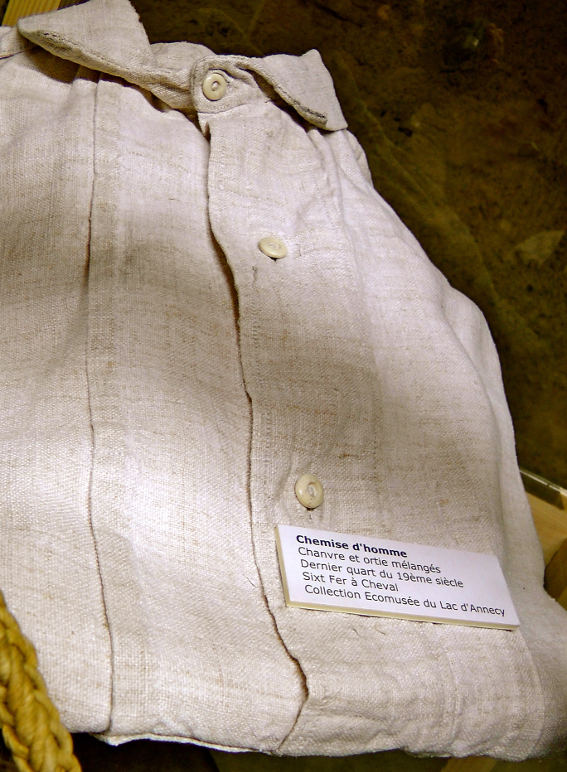
Fiber can be extracted from dried nettle stalks and then spun into a rough cordage or more finely made into cloth and clothing. Before the industrial revolution, durable clothing was made from nettle fiber. Despite its strong and durable fibers, we never figured out how to mechanize the process of making nettle fiber, so its use for clothing was dropped in the industrial era.
This photo of a shirt made from a combination of hemp and nettle was taken at a small museum in France.
Uses of Nettle Plant
Food Uses of Nettle Plant - How to Harvest, Cook Nettle
Stinging nettle can be eaten freely as food but it needs to be properly prepared. Harvest the leaves while the plant is young and before it flowers. Most people prefer to harvest using gloves to avoid being stung. If you harvest the top portion of the plant, leaving behind bottom leaves, it will grow back even denser. In cooler climates, it’s possible to tend a nettle patch and keep harvesting the leaves well into summer. Once harvested, blanch the leaves in boiling water for two minutes before using them as you would any cooked green. Nettle soup, lasagna, stir-fried greens, spanakopita, green smoothies, and nettle pesto are just a few examples. (Save the residual blanched water to drink as nettle tea or as a base for soups).
Medicinal Uses of Nettle Plant
Nettles can be used dried as nettle tea or prepared as a fresh plant tincture (alcohol extract) or vinegar. Freeze-dried products (powder or capsules) are also available. In my experience fresh nettle tincture or freeze-dried products are better for addressing acute seasonal allergy symptoms than the dried tea.
Nettle leaves are a food-like herb and, in many cases, will produce the best results with fairly high dosages. Nettles are a favorite herb for making nourishing herbal infusions, which is a strong tea. To make a nourishing infusion, you measure out 1 ounce of dried nettle leaf by weight. Put this in a quart sized jar. Fill the jar with just-boiled water. Cover and let sit for 4-8 hours or overnight. Strain off and compost the plant material and drink the strong tea within 36 hours. I like mine with an added tablespoon of dried peppermint herb in the blend. Some people like the flavor better when the infusion is warmed up. You can also add sweetener to taste.
Dosage suggestions
- Nettle leaf tea: up to 1 ounce (30 grams) of dried herb made into tea per day
- Fresh nettle tincture: (1:2, 50-90% alcohol) 60-90 drops 3-7 times a day
- Nettle root (decoction or powdered): 6-9 grams
- Nettle root tincture: (1:5, 30% alcohol, dried root): 2-3 mL, three times a day13
- Nettle seed: 1-2 grams (1-2 teaspoons up to 1-2 tablespoons) per day
- Nettle seed tincture: (1:5, 30% alcohol, ripe seed): 1.5-2 mL, three times a day14
Stinging Nettle Side Effects
Some people experience headaches when they drink strong nettle tea. This could be due to its diuretic effect causing dehydration. This is often self-limiting as the body becomes accustomed to its effects. In other words, when drunk regularly, nettles has less of a diuretic effect (as is true for most diuretics, even coffee).
The Botanical Safety Handbook gives nettle the highest safety rating. It also reports that in a review of studies with over 16,000 people there were no serious adverse effects reported.15
The Nettle Herb
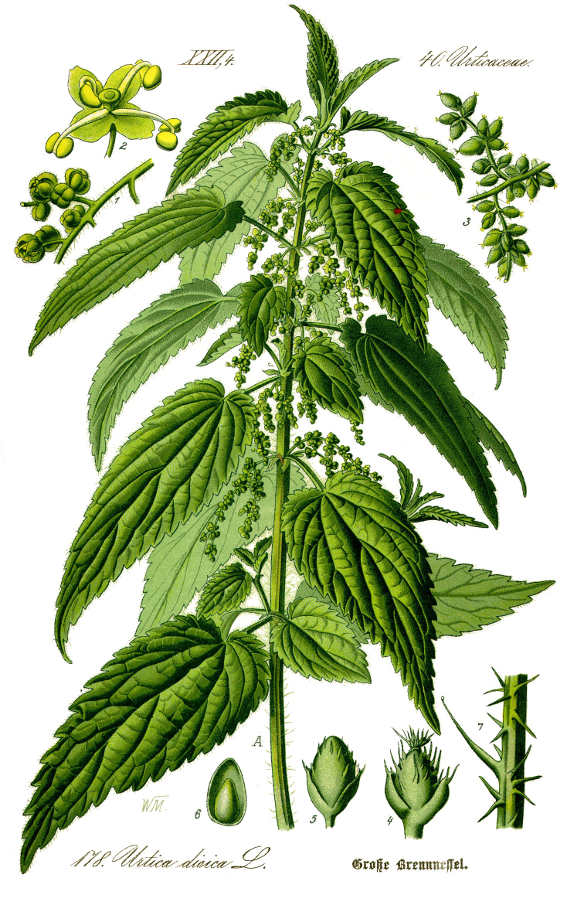
The nettle herb is an herbaceous perennial that can grow to about 3-6 feet in height (1-2 meters). It is both a native and introduced plant in North America and likes to grow in disturbed soils that are protein rich. It prefers damp soils.
It grows on long stalks that have a square stem with jagged simple leaves that grow opposite. Small needle-like projections cover the stalk and leaves of most species (however, “stingless” nettles do exist, even within the U. dioica species.)
Small flowers grow in the leaf axils in the summer, which turn to green fruits by the late summer. Both male and female flowers grow on a single plant in the Urtica dioica species.
Summary of Nettle Herb
Stinging nettle herb is a nutritious plant that gives us both food and medicine. It is a versatile herb that is commonly used for chronic health issues such as arthritis and type 2 diabetes, while also being used for acute care to relieve seasonal allergy symptoms. It is especially loved for being a powerhouse of nutrients - one of the highest in the plant world.
Additional Resources for Nettle Herb
- How to Make Nettle Tea for Seasonal Allergies
- The Benefits of Nettle Leaf Video
- Stinging Nettle with Rosemary Gladstar
Citations
Click to show/hide.
Rosalee is an herbalist and author of the bestselling book Alchemy of Herbs: Transform Everyday Ingredients Into Foods & Remedies That Healand co-author of the bestselling book Wild Remedies: How to Forage Healing Foods and Craft Your Own Herbal Medicine. She's a registered herbalist with the American Herbalist Guild and has taught thousands of students through her online courses. Read about how Rosalee went from having a terminal illness to being a bestselling author in her full story here.
